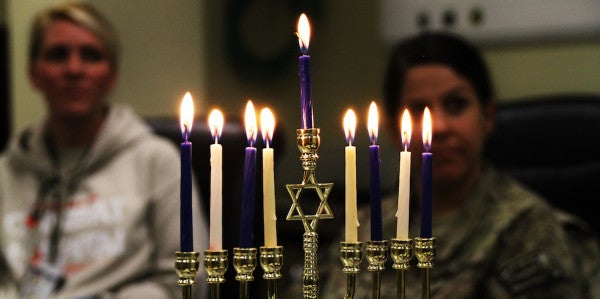What It’s Like Celebrating Hanukkah On Deployment
I always felt particularly lonely and isolated as a Jew deployed to the Middle East during Hanukkah, the week-long Jewish...

I always felt particularly lonely and isolated as a Jew deployed to the Middle East during Hanukkah, the week-long Jewish festival of lights. The holiday celebrates miracles and triumph in the rededication of the second temple in Jerusalem following a successful revolt of the Maccabees against the Syrian empire. Like many Jewish holidays, the overall theme of the holiday is to celebrate being alive. While Christmas is a big deal for most service members, and usually celebrated as a large group, the small number of Jews in any unit means Hanukkah can be a lonelier time. One deployment, I lit candles on a menorah, the traditional candelabrum of the holiday, on top of my foot locker alone in my containerized housing unit.
It was different when I was a kid. I grew up on the heavily Jewish Upper West Side of Manhattan and never felt that it was a big deal. In the Navy, I was suddenly part of a minority. Of the seven Hanukkahs I spent in the Navy, I spent nearly all of them away from family, including years I wasn’t deployed.

A menorah is lit to commemorate Hanukkah at the Forward Operating Base Lagman chapel in Zabul province, Afghanistan, Dec. 24, 2011.DoD photo
Don’t misunderstand. I found the military very welcoming and even encouraging of my decision to practice my faith, but often the fact that the Jewish calendar is not in synch with the Gregorian calendar meant that Hanukkah occurred during the frenetic final work days before holiday stand down. And though some of my Hanukkahs in the Navy were lonely, other years I found closeness in a makeshift family of teammates, some Jewish, and some who were just willing to learn about Jewish traditions and make me feel supported.
My first year in the Navy, I was at Officer Candidate school in Newport, Rhode Island, likely screaming my head off and doing pushups for some infraction real or invented. On Friday nights Jewish candidates were permitted to go to a temple in nearby Middletown for Shabbat services. I hope it doesn’t ruin it for current candidates to admit that we told the duty driver to pick us up later than the service ended because there was always plenty of otherwise-forbidden cookies and cake. We celebrated the second night of Hanukkah there, a welcome pause from the chaos of accession training.
Related: US Troops Have Been In Combat During Christmas Since America’s Founding »
I spent two Hanukkahs on deployment. On the first one, I was Jewish lay leader on an amphibious assault ship. On a ship of 3,000 people, we had anywhere from 6–10 people show up for services every Friday night. Some were Jewish, some were 7th Day Adventists, and some others just came because they were curious. The culinary specialists made a terrific challah bread for us and we’d go over lessons from the weekly torah reading that were relevant to our deployment. Days on deployment blend together, even moreso on ship than on land, largely because you rarely see the sun. Friday nights marked the fact that time was in fact passing, that the handful of us who observed the end of the week together would endure to the next one. Hanukkah in particular reminded us that the months had gone by. That year, for me personally, it meant it was almost time to go home. Right before Christmas, I transferred back to the United States and began training, only to go on deployment again shortly afterwards.
My loneliest Hanukkah was on an expeditionary ground deployment to the Middle East. Teammates joked I needed to hide my Jewishness, and perhaps not mention my last name so much (this proved to be irrelevant, but it made me nervous at the time). The Star of David necklace usually worn under my uniform was left back in the States. That was the year I lit the Hanukkah candles completely alone in my CHU.

Chaplain (Capt.) Andrew Cohen stands behind a lit menorah during the eighth day of Hanukkah at Joint Base Balad, Iraq.U.S. Air Force photo/Airman 1st Class Jason Epley
I am delighted when people wish me “Merry Christmas.” The intent of “I wish you a joyous season” is there. But I also always appreciated when people did acknowledge that I was missing a different holiday, that I felt the same loss of acutely missing family that comes with this time of year, and wished me “Happy Hanukkah” as well.
Hanukkah this year directly coincides with the days from Christmas Eve until New Year’s Day, and I am grateful that I’ll be with family for most of them. It has been a long-missed tradition to get to light candles the cold darkness of East Coast winter with family. In addition to the Hanukkah prayers, on the first and last night of Hanukkah, Jews say a special prayer called shehecheyanu, a prayer that expresses thanks for being alive to reach this season. After so many years away, I’m just happy to be here.
To the Jewish service members who have the watch, happy Hanukkah.